|
|
|
Sort Order |
|
|
|
Items / Page
|
|
|
|
|
|
|
| Srl | Item |
| 1 |
ID:
124314
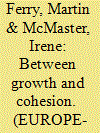

|
|
|
|
|
| Publication |
2013.
|
| Summary/Abstract |
THE ISSUE OF REGIONAL DEVELOPMENT IS HIGH ON THE POLICY agenda in Central and Eastern Europe (CEE). Indeed, for a variety of reasons, these countries are currently seen as some of the most interesting 'laboratories' for regional development in the European Union (EU) and beyond. First, from a situation in the early and mid-1990s where ?nances for regional development in these countries were very limited, there are now signi?cant levels of funding available. These ?nances ?ow predominantly from the structural funds available under EU cohesion policy, of which CEE member states are the biggest bene?ciaries in the EU. As the contribution by Ferry and McMaster notes, this brings with it opportunities to expand the scope and impact of regional development interventions. However, it also puts pressure on regional policy systems in these countries to develop structures and processes to absorb the funds, to ensure that they contribute to strategic economic growth, and to maintain a clear vision for domestic regional development.
|
|
|
|
|
|
|
|
|
|
|
|
|
|
|
|
| 2 |
ID:
129647
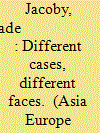

|
|
|
|
|
| Publication |
2014.
|
| Summary/Abstract |
Chinese investment in Central and Eastern Europe (CEE) is booming. As China's investment pattern has emerged so far, it appears to have little to do with Chinese firms' preferences for liberal policy regimes, tolerance for corruption, or reliance on communist-era networks. This article documents the current size and shape of Chinese firms' efforts to internationalize in this economic space, demonstrating an important difference between Chinese investment behavior in CEE and in the EU-15, namely the region's much more active use of greenfield activity (and lighter use of M&A and strategic alliances). Case studies of each mode (greenfield, M&A, and strategic alliances) reveal little evidence of a "China, Inc." approach and much evidence that Chinese firms are more motivated by market access than by technology or management assistance.
|
|
|
|
|
|
|
|
|
|
|
|
|
|
|
|
| 3 |
ID:
127050


|
|
|
|
|
| Publication |
2013.
|
| Summary/Abstract |
Central and Eastern European (CEE) countries are undergoing a transition from one socio-economic system to another. Individuals, communities and societies are in a state of continuous transformation necessitated by the globalization of markets and changes in basic traditional behavioral modes, primarily economic ones. The changes necessitated by systemic transition, on the one hand, and those determined by the logic of globalization (for CEE countries the process also means regional unification as they integrate into the European market), on the other, will hardly be agreeable and smooth.
In most CEE countries, the state still remains not only a most influential economic actor but, in fact, also the dominant and, in some cases, hegemonic one. The share of the gross domestic product redistributed through budgets of all levels is still high. Governments have large property and actively pursue their economic interests by establishing new laws.
|
|
|
|
|
|
|
|
|
|
|
|
|
|
|
|
| 4 |
ID:
124327
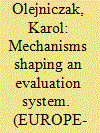

|
|
|
|
|
| Publication |
2013.
|
| Summary/Abstract |
A criticism of evaluation practice in regional policy in Central and Eastern Europe (CEE) countries is that it stresses its function in terms of accountability and formal reporting on progress, rather than its role in policy or institutional learning. This article aims to test this critique through the use of 'system thinking' and focuses on the case of regional policy in Poland, where evaluation practice has developed dynamically since 2000. It contributes to the literature by developing an analytical framework that sets out the role of evaluation in regional policy learning and identifies key factors and mechanisms that determine the development of an effective evaluation system for regional policy. The analysis draws on all Polish evaluation studies conducted between 1999 and 2010, interviews with civil servants and experts involved in the implementation of cohesion policy programmes, as well as secondary data from earlier studies. The essay identifies key mechanisms and factors that determine the main function of evaluation as a learning tool that produces and utilises knowledge in the decision-making process. These main elements are: growth in funding of the policy; stability of institutions; motivators; and system architecture.
|
|
|
|
|
|
|
|
|
|
|
|
|
|
|
|
| 5 |
ID:
132945
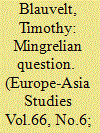

|
|
|
|
|
| Publication |
2014.
|
| Summary/Abstract |
Based on primary source materials from the Georgian Party archive and periodical press, this article examines the conflict between central and local elites in the Soviet Republic of Georgia over whether or not to grant linguistic and territorial rights to residents of one of its regions. The case demonstrates how the promises and aspirations of Soviet nationality policy were actually negotiated and interpreted on the local level in the early years of Soviet power, and how actors attempted to make use of nationality policy in order to mobilise the institutional resources available to them.
|
|
|
|
|
|
|
|
|
|
|
|
|
|
|
|
| 6 |
ID:
130224
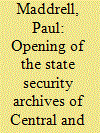

|
|
|
|
|
| Publication |
2014.
|
| Summary/Abstract |
Laws passed since 1991 1 have opened the state security archives of the former Communist states of Central and Eastern Europe. Such legislation is in place throughout the former Soviet Bloc, but the focus here is on the opening of the German and Romanian archives. The process is far advanced in Germany and much less so in Romania. The contrast between the two very well displays the issues involved.
The opening of the archives has been an important tool of de-Communization. The process has been fullest in Germany because of the strength and self-confidence of the German legal system and because of the weakness of the Communists' political position. It has been partial in Romania because the legal system there lacks authority, independence, and self-confidence, and the Communists have remained strong.
Important differences exist between the various former Soviet bloc countries, but, generally speaking, the institutions which now hold the Communist-era state security records have four tasks:
1. to enable the connections of public officials with the former Communist security and intelligence services to be investigated so that those who collaborated with those services can be removed from public office ("lustration," as it is called);
2. to make available to targets of Communist-era surveillance and repression the records held on them;
3. to make records available for the prosecution of those who committed crimes during the period of Communist rule; and
4. to enable historians and journalists to write the history of Communist surveillance and repression more accurately and fully.
These four tasks serve the purposes of building stable democratic institutions which enjoy public trust, and of giving victims of the Communist security services a measure of retrospective justice.
|
|
|
|
|
|
|
|
|
|
|
|
|
|
|
|
| 7 |
ID:
132941
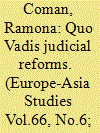

|
|
|
|
|
| Publication |
2014.
|
| Summary/Abstract |
This article examines judicial reforms in the new member states of the EU in a comparative perspective. It explores the interactions between domestic and European actors in the Czech Republic, Poland, Hungary, Romania and Bulgaria and explains why the EU has had a differential impact on the way the principle of judicial independence has been implemented nationally. The differential impact of the EU is explained by considering both the nature of EU conditionality and the relationship between the judiciary and the political actors at the domestic level. The comparison reveals that the power of the EU is greater when tensions at the domestic level between judicial and political actors increase.
|
|
|
|
|
|
|
|
|
|
|
|
|
|
|
|
| 8 |
ID:
132943
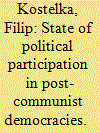

|
|
|
|
|
| Publication |
2014.
|
| Summary/Abstract |
The article assesses the state of political participation in Central and East European post-communist democracies. Incorporating the most recent data, it compares the emerging trends in political participation to those observed in the established democracies of Western Europe. The findings reveal that post-communist citizens participate substantially less than their Western counterparts, and, contrary to some expectations, no convergence has been taking place. This is due to a host of factors, the importance of which seems to vary according to the type of political activity. It is subsequently shown that while political participation is lower than in Western Europe, it is not markedly more biased. The poor state of political participation therefore does not appear to seriously undermine the quality of the post-communist democratic process.
|
|
|
|
|
|
|
|
|
|
|
|
|
|
|
|
|
|
|
|
|